Pilot Butte, Saskatchewan
Pilot Butte (/paɪlɪt ˈbjuːt/; Cree: Otasawâpiwin [oʊtəsəwəpiːwɪn]; Ojibwe: Akawaabiwin [əkəwaːbiːwɪn]), meaning "lookout point", is a town in southern Saskatchewan located in the White Butte area between Highway 46 and the Trans-Canada Highway. The town is a neighbour to Balgonie, White City, and the province's capital city, Regina. As of the 2016 census, Pilot Butte had a population of 2,183, an 18% growth from 2011.[7] The town is governed by the Pilot Butte Town Council and is surrounded by the Rural Municipality of Edenwold No. 158.[8]
Pilot Butte
| |
|---|---|
| Town of Pilot Butte | |
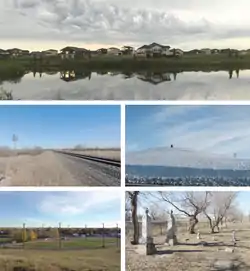 From top to bottom; left to right: houses in Discovery Ridge, the CPR Mainline, the Butte Hill, a baseball diamond in Inland Park, and graves at St. George's Cemetery. | |
 Flag | |
| Nickname(s): | |
| Motto(s): "The Town That Cares" | |
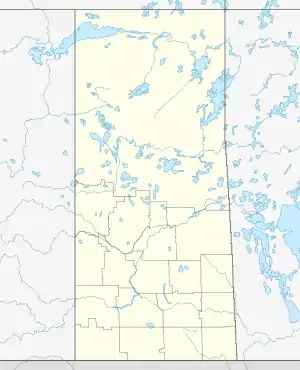 Pilot Butte Location within Saskatchewan  Pilot Butte Location within Canada | |
| Coordinates: 50°28′41″N 104°25′00″W | |
| Country | Canada |
| Province | Saskatchewan |
| Treaty | Treaty 4 |
| Settled | 1882 |
| Incorporated | 1913 as a village 1979 as a town |
| Government | |
| • Mayor | Peggy Chorney[2] |
| • MP | Andrew Scheer (CPC) |
| • MLA | Don McMorris (SKP) |
| Area | |
| • Total | 5.78 km2 (2.23 sq mi) |
| Elevation | 610 m (2,000 ft) |
| Population (2016)[3] | |
| • Total | 2,137 (41st) |
| Time zone | UTC−06:00 (CST) |
| Postal code | S0G 3Z0 |
| Area code(s) | 306 639 |
| Highways | Hwy 46, Hwy 362, Hwy 624 |
| Railways | Canadian Pacific |
| Website | http://www.pilotbutte.ca |
| [4][5][6] | |
Prior to European arrival, local Indigenous peoples camped near Boggy Creek and used the butte as a lookout point.[8] European settlement began in the area in the 1840s, and Pilot Butte was established in 1882. Pilot Butte's early development was more substantial than neighbouring settlements thanks to its brick plants, sand and gravel deposits, and location on the Canadian Pacific Railway mainline. The village flourished in its early 20th Century heyday with a population nearing 1000; however, following World War I, most of its residents and buildings, including a hotel, train station, and water tower, were dismantled or destroyed.[9]
The completion of the Trans-Canada Highway in the 1950s brought people back out to Pilot Butte. The village gained town status in 1979 and its population passed 1000 for the first time in decades.[8] A year later, the name "Sand Capital of Canada" was chosen in a town slogan contest,[9] and in 1982, Pilot Butte celebrated its 100th anniversary and a monument was erected atop Butte Hill.[9] In 1995, the Pilot Butte Storm damaged most of the buildings and nearly every tree town.[10][11][12]
Since the storm, the town has continued to grow; today, it is home to over 2000 people as well as many businesses and recreational facilities. The town is home to multiple minor sports organizations, as well as the Pilot Butte Storm junior hockey club.[13] Pilot Butte hosted the Western Canadian Softball Championships in 2002[9] and an annual rodeo has attracted visitors to the town every summer since 1993. The 2010s saw the beginning of new housing and commercial developments in town, as well as various infrastructure updates,[14][15] which have continued to attract new residents.[8]
Etymology
The town's name, meaning "lookout point",[16] was chosen in 1883 as the name for the settlement. The origin of the community name is derived from the flat-topped hill located in the town that served as a lookout for hunting buffalo.
The Cree call the hill and the town Otasawâpiwin (ᐅᑕᓴᐚᐱᐏᐣ), meaning "his lookout", and speakers of Ojibwe call it Akawaabiwin, meaning "lookout place".[16]
History
Indigenous peoples
The Butte played a significant role in the lives of the local Indigenous peoples, who camped near Boggy Creek and used the Butte as a lookout and signal point.[8] The Cree called the hill otasawâpiwin, meaning "his outlook" or "his lookout", and the Ojibwe called it Akawaabiwin, meaning "lookout place".[16]
Settlement and founding
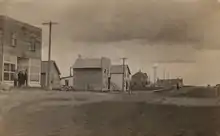
European settlement in the area can be traced back to the 1840s, with the Dominion Lands Act of 1872 encouraging homesteaders to come to the area where they could purchase 160 acres (0.65 km2) of land for $10.[9] By 1882, the Canadian Pacific Railway had made its way through the District of Assiniboia; between Pilot Butte and Regina a crew set a company record for the most track laid in a single day.[17]
With the construction of the railway through the region, the village was established and the area's sand and gravel deposits were extensively utilized. In the following years, as settlers began farming in the district, Pilot Butte developed, with the name being chosen in 1883 to mean "lookout point".[18] Early homes in the village were built on the south side of the track using bricks from the local red brick plant, which began production in 1890.[9] In 1891, Pilot Butte School District No. 207 was established; the school was located south of town.[19]
Because of Pilot Butte's location on the Canadian Pacific Railway mainline, significant settlement took place between 1880 and 1900, and a second brick plant began production in 1900. The village's sand and gravel deposits were used during the construction of the railway and for the local brick plants.[9]
Heyday and decline
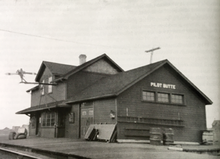
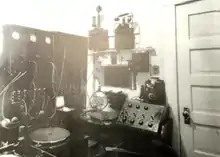
The settlement had grown greatly since its founding; a post office opened in October 1903, and by 1913, Pilot Butte had a population of almost 1000 and was incorporated as a village. At one point, the village offered the Canadian Pacific Railway a reliable year round water source so a water conduit was built to Regina. During its peak, the village boasted a railway station, three grain elevators, a stockyard, the Kitchener Hotel, boarding houses, a pool hall, bowling alley, general store, butcher and blacksmith shops, two churches, and two section houses.[8][9] In 1913, a two-storey, red brick school was built in town, which also served as a community centre.[19]
The vilalge's brickyards were major local employers (employing over 800 people at one point);[8] however, they closed during World War I. During the war in 1915, the town unsuccessfully attempted to drill for oil.[9] With automobiles allowing for easy transport to Regina, Pilot Butte began to lose its population—a trend that would continue for years. In 1923, the village council was disbanded because of the loss in population.[8] During the Great Depression and leading up to World War II, Pilot Butte had lost most of the residents and services that it once had. In 1926, the CHWC radio station began broadcasting from the Kitchener Hotel, but the broadcasting ended in 1936 when the hotel eventually closed.[9]
Today, the old Pilot Butte schoolhouse is located to the north of the town on private property, and the Arrat schoolhouse is located directly south of St. George's cemetery. Except for the schoolhouses and the Marin House, a house on Railway Avenue built of brick from the red brick plant, there are few physical reminders of the town's early development; most original structures, such as the hotel, train station, and water tower, have all been dismantled or destroyed.[9]
Post-war regrowth
In 1946, the Pilot Butte Memorial Hall was opened; Premier Tommy Douglas was in attendance and spoke at the ceremony.[9] The Trans-Canada Highway was completed through Saskatchewan in 1957;[20] similarly to the building of the railway, the new highway attracted new residents to move to Pilot Butte, as the village became a popular option for those wanting to live in a town but commute to the city. Because of the growing population, the brick school was replaced by a larger, stucco school in 1958.[19] In 1963 the town re-acquired village status,[8] and in the following years, the town saw infrastructure updates and a continued population growth. In 1964, street lights were installed in the village;[9] in 1968, the village saw the introduction of street signs and its first zoning bylaw; and in 1976, construction began on the Pilot Butte rink and recreation complex.[9] Towards the end of the decade, the water tower was destroyed and construction began on a village office on Railway Avenue.[9]
By 1979, the community acquired town status as its population passed 1000 for the first time in decades.[8] A year later, the name "Sand Capital of Canada" was chosen in a town slogan contest,[9] and in 1981, the Royal Canadian Mounted Police began providing police services to the town.[9] In 1982, Pilot Butte celebrated its 100th anniversary and a monument was erected atop Butte Hill. The same year, construction began on a new fire hall on Railway Avenue. In 1985, a library was opened in town,[9] and in 1988, Pilot Butte School received a large expansion and renovation which included more classrooms, a science lab, home economics lab, stage, art room, and gymnasium.[19]
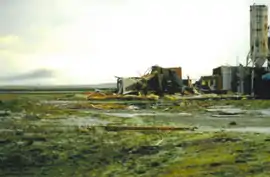
Pilot Butte Storm and recent history
A violent storm known as the Pilot Butte storm hit the area on 26 August 1995, damaging most homes in the community. In the following years, trees were replanted throughout town and homes were repaired.[10][11][12] In August 2020, residents of the town observed a 25-year-anniversary of the event.[18]
Since the storm, the town has continued to grow, serving as a home to around 2000 people as well as a post office, school, church, library, gas station, and various restaurants and manufacturing plants. Recreational facilities in town include an indoor and outdoor rink, four ball diamonds, a splash park, and various other parks.[18] In 2001, the Regina Express junior hockey team were relocated to Pilot Butte; the team would be renamed to the Pilot Butte Storm in 2003 (after the 1995 storm) and go on to win the PJHL title four times and win bronze at the Keystone Cup in 2011.[13]
In 2002, Pilot Butte hosted the Western Canadian Softball Championships,[9] and in 2007, the town celebrated its 125th anniversary with a slow-pitch tournament, powwow, the introduction of a town flag, and the writing of a town history book.[9] The community's annual rodeo has attracted visitors to the town every summer since 1993. The 2010s saw the beginning of new housing and commercial developments in town, which have continued to attract new residents.[8] Construction was completed on a new water treatment and sewer disposal facility in 2014,[14] and the town received federal and provincial funding for wastewater treatment upgrades in 2017.[15] In 2018, a diverging diamond interchange opened on the Pilot Butte access road as part of the Regina Bypass project, only the second of its kind in Canada.[21]
Geography
The town is situated on a broad, flat, treeless and largely waterless plain. The Butte Hill, the hill which the town is named after, is the highest point in the area. Like in Regina, all of the town's trees, shrubs, and other plants were hand-planted,[22] and because of the Pilot Butte storm, many trees have been re-planted since 1995.[12]
Climate
Pilot Butte experiences a dry humid continental climate (Köppen: Dfb) in the NRC Plant Hardiness Zone 3b.[23] Pilot Butte has warm summers and cold, dry winters, prone to extremes at all times of the year. Precipitation is heaviest from June through August in the form of rain, while snow is common in the winter. An average summer day has a high of 24.5 °C (76.1 °F), although temperatures can reach as high as 40.0 °C (104.0 °F), while the average winter day has a low of −20.2 °C (−4.4 °F), with temperatures reaching below −45.0 °C (−49.0 °F).
| Climate data for Zehner (9 km north of Pilot Butte), 1981–2010 normals | |||||||||||||
|---|---|---|---|---|---|---|---|---|---|---|---|---|---|
| Month | Jan | Feb | Mar | Apr | May | Jun | Jul | Aug | Sep | Oct | Nov | Dec | Year |
| Record high °C (°F) | 7.0 (44.6) |
9.0 (48.2) |
20.0 (68.0) |
29.0 (84.2) |
33.5 (92.3) |
39.0 (102.2) |
37.5 (99.5) |
37.5 (99.5) |
34.5 (94.1) |
29.0 (84.2) |
18.0 (64.4) |
10.5 (50.9) |
39.0 (102.2) |
| Average high °C (°F) | −10.4 (13.3) |
−7.1 (19.2) |
0.7 (33.3) |
10.3 (50.5) |
17.7 (63.9) |
22.0 (71.6) |
24.4 (75.9) |
24.5 (76.1) |
17.6 (63.7) |
9.9 (49.8) |
−2 (28) |
−8.8 (16.2) |
8.1 (46.6) |
| Daily mean °C (°F) | −15.3 (4.5) |
−11.8 (10.8) |
−5.2 (22.6) |
4.2 (39.6) |
11.3 (52.3) |
16.0 (60.8) |
18.1 (64.6) |
17.9 (64.2) |
11.5 (52.7) |
4.4 (39.9) |
−6.2 (20.8) |
−13.3 (8.1) |
2.6 (36.7) |
| Average low °C (°F) | −20.2 (−4.4) |
−16.4 (2.5) |
−9.7 (14.5) |
−1.8 (28.8) |
4.8 (40.6) |
9.9 (49.8) |
11.8 (53.2) |
11.2 (52.2) |
5.4 (41.7) |
−1.2 (29.8) |
−10.3 (13.5) |
−17.9 (−0.2) |
−2.9 (26.8) |
| Record low °C (°F) | −38.5 (−37.3) |
−41.5 (−42.7) |
−33.5 (−28.3) |
−20 (−4) |
−8 (18) |
−1 (30) |
4.0 (39.2) |
−0.5 (31.1) |
−6 (21) |
−23 (−9) |
−34.5 (−30.1) |
−43 (−45) |
−43 (−45) |
| Average rainfall mm (inches) | 0.1 (0.00) |
0.2 (0.01) |
2.8 (0.11) |
16.4 (0.65) |
48.2 (1.90) |
81.3 (3.20) |
80.5 (3.17) |
53.7 (2.11) |
42.8 (1.69) |
22.5 (0.89) |
1.9 (0.07) |
0.0 (0.0) |
350.4 (13.80) |
| Average snowfall cm (inches) | 21.6 (8.5) |
15.1 (5.9) |
23.6 (9.3) |
7.2 (2.8) |
4.0 (1.6) |
0.3 (0.1) |
0.0 (0.0) |
0.0 (0.0) |
3.1 (1.2) |
9.9 (3.9) |
17.3 (6.8) |
23.5 (9.3) |
125.6 (49.4) |
| Source: Environment Canada[24] | |||||||||||||
Demographics
| Year | Pop. | ±% |
|---|---|---|
| 1901 | 296 | — |
| 1906 | 559 | +88.9% |
| 1911 | 608 | +8.8% |
| 1916 | 650 | +6.9% |
| 1921 | 641 | −1.4% |
| 1941 | 40 | −93.8% |
| 1966 | 405 | +912.5% |
| 1971 | 344 | −15.1% |
| 1976 | 585 | +70.1% |
| 1981 | 1,256 | +114.7% |
| 1986 | 1,387 | +10.4% |
| 1991 | 1,450 | +4.5% |
| 1996 | 1,469 | +1.3% |
| 2001 | 1,850 | +25.9% |
| 2006 | 1,867 | +0.9% |
| 2011 | 1,848 | −1.0% |
| 2016 | 2,183 | +18.1% |
| Source: Statistics Canada[25][26][27][28] | ||
According to the 2016 Canadian Census, the population of Pilot Butte is 2,137, a 16% increase from 2011. There are 791 dwellings with an occupancy rate of 96%, and the population density is 369.6 people per square km. The median age is 36 years old (35.7 for women and 36.3 for men), which is lower than the median age of Canada at 40.6 years old. Most residents in Pilot Butte speak English (96.8%), while a small number speak French (0.4%) and the remaining 2.7% of the population have another mother tongue. As of 2016, the most common ethnic origins in Pilot Butte were German (41.8%), English (23.5%), Scottish (23.2%), Ukrainian (18.8%), and Irish (15.0%).[29]
Culture
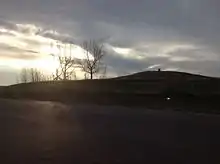
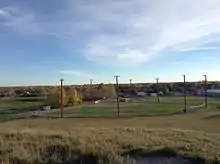
The town hosts the Annual Pilot Butte outdoor rodeo on the third weekend of June every year since 1993, complete with cabaret featuring current country headline musicians. Pilot Butte also has the Golden Sunset Recreational Club (55+ Club), the Pilot Butte Beavers/Cubs/Scouts, a library, the Pilot Butte Photo Bunch and the Pilot Butte Riding Club. Every year, Pilot Butte hosts the “Lite-up Pilot Butte” Christmas decorating contest, which has been going on for 27 years. The town also has distributed the News and Views newsletter to residents of Pilot Butte and the surrounding area since October 1987.[18]
Parks and attractions
Pilot Butte features multiple parks, most notably Inland Park, which is home to the Butte Hill, Town Hall, four baseball diamonds, the indoor and outdoor rinks, public library, two play structures, a splash park, and a skate park. As well, the Discovery Ridge housing development is home to a small lake, a soccer field, and biking and walking paths.[18] Nearby White Butte Trails Provincial Recreation Site is home to trails for cross-country skiing in the winter and biking and running in the summer.[30] Nearby golf courses include, Westfalia, Green Acres, Murray, and Tor Hill.[30]
Sports
The Pilot Butte Storm, 4-time winners of the Prairie Junior Hockey League,[31] play home games at the local rink in Pilot Butte. The team played in the provincial championship ten years in a row (2006-2015). The Pilot Butte Broncos minor hockey teams had always played in the Mainline Hockey League but now the Prairie Storm Minor Hockey Association, (through Hockey Regina) has the local minor hockey teams. The Prairie Storm Minor Hockey Association teams have kids from Pilot Butte, Emerald Park, White City and Balgonie. The White Butte Minor Ball Association offers Broncos Baseball and Storm Softball. In the town/area there is also Buffalo Plains Ringette, City View Skating Club, White Lightning Ringette, Pilot Butte Soccer, White Butte Minor Ball and the North Griffins in Regina Minor Football. North-west of the town lies Kings Park Speedway, a ⅓-mile (0.5 km) paved oval used for stock car racing since 1967.
Notable people
Notable people that were born in or lived in Pilot Butte include:
- Clayton Gerein, wheelchair athlete and seven-time Paralympian; lived in Pilot Butte[32][33][34]
- Jared Legien, professional ice hockey player; grew up in Pilot Butte[35][36]
- Reuben Ross, diver and two-time Olympian; grew up in Pilot Butte[34][37]
Electoral history
| Year | NDP | Liberal | Cons. | Others |
|---|---|---|---|---|
| 2019 | 12.7% 299 | 5.1% 122 | 78.1% 1836 | 4.1% 94 |
| 2015 | 19.1% 370 | 18.6% 360 | 60.1% 1166 | 2.2% 43 |
| 2011 | 27.6% 427 | 3.8% 59 | 64.9% 1005 | 3.7% 57 |
| 2008 | 24.3% 346 | 10.1% 144 | 59.3% 847 | 6.4% 91 |
| 2006 | 28.0% 423 | 15.5% 233 | 52.0% 782 | 4.5% 67 |
| 2004 | 29.3% 314 | 25.0% 370 | 42.0% 530 | 3.7% 47 |
| 2000 | 36.5% 406 | 14.2% 158 | 49.3% 548 | – |
| 1997 | 38.4% 366 | 20.1% 193 | 34.3% 328 | 7.2% 67 |
- 2020: elected Chorney (X) with 82.3% of vote (see more)
- 2016: elected Chorney with 60.7% of vote (see more)
- 2012: elected Ross (see more)
- 2009: elected Saum (see more)
- 2006: elected Zsombor (X) (see more)
- 2003: elected Zsombor (X)
- 2000: elected Zsombor (X)
- 1997: elected Zsombor (X)
- 1994: elected Zsombor (X)
- 1991: elected Zsombor (X)
- 1988: elected Zsombor
- 1985: elected Bleakley (X)
- 1984: elected Bleakley
- 1982: elected Passmore
- 1980: elected Dueck
- 2020: elected Einarson, Forster, Lowenberger (X), Riopka (X), Salerno, Sigmeth (X) (see more)
- 2016: elected Bloomaert, Lowenberger, Mackenzie, Riopka, Schmidt, Sigmeth (X) (see more)
- 2012: unknown (see more)
- 2009: elected Bowles (X), Ernst (X), Kistner (X), Kovacs, Leir (X), Ross (see more)
- 2006: elected Bowles, Ernst (X), Halipchak (X), Kistner (X), Lier, Tonita (see more)
- 2003: elected Ackerman (X), Ernst (X), Halipchak, Jacobson (X), Kistner, Schaeffer
- 2000: elected Ackerman (X), Boychuk, Ernst (X), Jacobson, Robinson (X), Yake
- 1997: elected Ackerman (X), Devers (X), Ernst, Ritmiller (X), Robinson (X), Rogers
- 1994: elected Ackerman (X), Devers, Duncan (X), Hubick (X), Ritmiller, Robinson (X)
- 1991: elected Ackerman (X), Duncan (X), Hubick (X), Popik (X), Rissling (X), Robinson
- 1988: elected Ackerman, Duncan, Folk, Hubick (X), Popik, Rissling (X)
- 1985: elected Graham (X), Hubick, Larson (X), Rissling (X), Verity (X), Zsombor
- 1984: elected Anderson (X), Engel (X), Graham, Larson (X), Rissling (X), Verity (X)
- 1982: elected Anderson (X), Bleakley, Engel, Larson, Rissling, Verity (X)
- 1980: elected Anderson, Brandsgard, Callfas, Passmore, Verity, Yurkoski
Mayoral history: Dueck 1980-1982, Passmore 1982-1984, Bleakley 1984-1988, Zsombor 1988-2009, Saum 2009-2012, Ross 2012-2016, Chorney 2016-present.
References
- Karpan, Robin and Arlene. Saskatchewan Trivia Challenge. Parkland Publishing. ISBN 978-0-9683579-2-7.
- Municipal Directory System
- "Population and dwelling counts, for Canada, provinces and territories, and census subdivisions (municipalities), 2016 and 2011 censuses – 100% data (Saskatchewan)". Statistics Canada. February 8, 2017. Retrieved April 14, 2017.
- "2011 Community Profiles". Statistics Canada. Government of Canada. Retrieved 2013-11-26.
- National Archives, Archivia Net. "Post Offices and Postmasters". Archived from the original on 2006-10-06. Retrieved 2013-11-26.
- Government of Saskatchewan, MRD Home. "Municipal Directory System". Archived from the original on 2016-01-15. Retrieved 2013-11-26.
- "Population of census metropolitan areas". Statistics Canada. Archived from the original on 16 December 2016. Retrieved 9 August 2015.
- The Canadian Encyclopedia. "Pilot Butte". Retrieved 2013-11-26.
- Celebrating 125 Years of Living – The History of Pilot Butte, Saskatchewan. Regina, Saskatchewan. 2007. ISBN 978-1-897010-41-9.
- Producer, Western. "Western Producer". www.producer.com. Retrieved 2016-12-04.
- "Saskatchewan Weather | SKstorm.net". Saskatchewan Weather | SKstorm.net. Retrieved 2016-12-04.
- PAYNE, MICHAEL. "Pilot Butte". The Canadian Encyclopedia. Retrieved 2016-12-04.
- "PHJL Regular Season and Playoffs Standings Since 2005". Prairie Junior Hockey League. PJHL. Retrieved 26 October 2015.
- "New Water Treatment and Sewage Disposal Facility for Pilot Butte". Government of Saskatchewan.
- "Pilot Butte, Sask. getting funding for wastewater treatment upgrades". Global News.
- Barry, Bill (2005). Geographic Names of Saskatchewan. People Places Publishing. ISBN 1897010192.
- Karpan, Robin. (2000). Saskatchewan trivia challenge. Karpan, Arlene. Saskatoon: Parkland. ISBN 0-9683579-2-X. OCLC 43847044.
- "Town of Pilot Butte". Pilot Butte Town History.
- "About Our School". www.pvsd.ca. Retrieved 2020-08-27.
- "Saskatchewan History Timeline". World Atlas.
- "Pilot Butte overpass now open to traffic". Regina Leader-Post.
- "Regina," The Encyclopedia of Saskatchewan Archived 29 April 2008 at the Wayback Machine. Retrieved 11 July 2007.
- "Plant Hardiness Zone by Municipality". Natural Resources Canada. Government of Canada. Archived from the original on 17 August 2016. Retrieved 31 July 2016.
- "ZEHNER Climate Normals". Canadian Climate Normals 1981–2010. Environment Canada. Retrieved 28 August 2020.
- Census of the Northwest Provinces, Manitoba, Saskatchewan and Alberta, 1906. Internet Archive. 1906–1907.CS1 maint: others (link)
- Canada. [Census and statistics office]; Blue, Archibald (1912). Fifth census of Canada 1911. Cornell University Library. Ottawa, Printed by C.H. Parmelee.
- Census of Prairie Provinces, 1926: population and agriculture, Manitoba, Saskatchewan, Alberta (PDF). 1926.
- Government of Canada, Statistics Canada (2017-02-08). "Census Profile, 2016 Census - Pilot Butte, Town [Census subdivision], Saskatchewan and Division No. 6, Census division [Census division], Saskatchewan". www12.statcan.gc.ca. Retrieved 2020-08-27.
- Government of Canada, Statistics Canada (2017-02-08). "Census Profile, 2016 Census - Pilot Butte, Town [Census subdivision], Saskatchewan and Division No. 6, Census division [Census division], Saskatchewan". www12.statcan.gc.ca. Retrieved 2020-08-27.
- "White Butte Trails Recreation Site | Tourism Saskatchewan". www.tourismsaskatchewan.com. Retrieved 2020-08-27.
- "PHJL Regular Season and Playoffs Standings Since 2005". Prairie Junior Hockey League. PJHL. Retrieved 26 October 2015.
- "Clayton Gerein - Obituary". Obituary.com. Retrieved 2020-09-30.
- "Clayton Gerein". The Encyclopedia of Saskatchewan. Retrieved 2020-09-30.
- "About Pilot Butte". Town of Pilot Butte. Retrieved 2020-09-30.
- "Saskatchewan Junior Hockey League (SJHL)". www.sjhl.ca. Retrieved 2021-01-27.
- "Jared Legien Honoured as 2019-20 ACAC Men's Hockey Rookie of the Year". Alberta Colleges Athletic Conference. 2020-03-19. Retrieved 2021-01-27.
- "november 2009 - Town of Pilot Butte - canada". doczz.net. Retrieved 2021-01-29.
- Canada, Elections. "Elections Canada's Official Reports". elections.ca. Retrieved 2020-07-27.
- Saskatchewan, Elections. "Election Results". elections.sk.ca. Retrieved 2020-07-27.
- Administrator. "CANDIDATES LIST". pilotbutte.ca. Archived from the original on 2016-10-18. Retrieved 2016-10-17.
